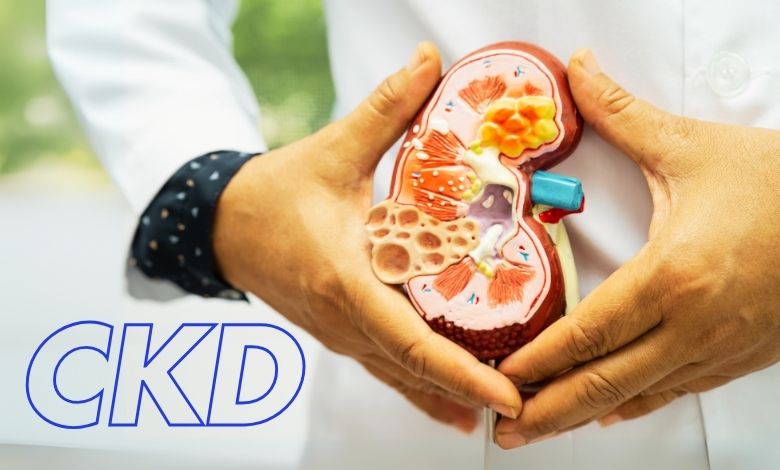Cardiovascular disease (CVD), which also raises morbidity and death, is the primary cause of chronic kidney disease (CKD). The risk of CVD mortality doubles and triples in stages 3 and 4 of CKD, respectively. In this complex and reciprocal interplay, each disease advances and increases the incidence of the others. The cardiorenal syndrome, in which the failure of one organ causes and exacerbates the failure of the other, indicates that the heart and kidney are, in fact, tightly connected. To help you better understand this disease, we’ve put together a guide on how to reduce the progression of CKD/CVD over time.
Strategies to reduce the progression of CKD/CVD:
When chronic kidney disease (CKD) is detected early on, there are numerous strategies to help postpone kidney failure. Use the following strategies and consult with a nephrologist for guidance on how to reduce the progression of CKD/CVD.
Manage your blood pressure:
It may be possible to reduce the progression of CKD/CVD by keeping blood pressure within a healthy range. This is especially true for people who have diabetes and proteinuria, or urine containing protein. A healthy weight, physical activity, meditation, reducing alcohol and salt intake, and quitting smoking are a few examples of lifestyle changes that can lower blood pressure. The doctor could advise taking daily blood pressure medication and making lifestyle changes if you have been diagnosed with hypertension.
Keep an eye on your blood sugar:
Controlling your blood glucose (blood sugar) levels if you have diabetes may help prevent kidney disease from progressing as quickly. Adopt a kidney- and diabetes-friendly diet, and pay attention to your doctor’s advice regarding insulin dosages and other drugs.
Decrease Your Sodium Consumption:
Lowering your consumption of salt is another important strategy to reduce CKD/CVD. By doing this, you can lessen overall renal strain and help regulate blood pressure. Ideally, you should keep your daily sodium consumption to 2,300 mg, but depending on the severity of your renal illness, the doctor might advise you to consume less. Just keep in mind that electrolytes are still crucial, so you should give superior meals with healthy sodium a higher priority than regular table salt.
Regular Exercise:
Regular exercise offers further advantages. 20 to 30 minutes a day, or 150 minutes a week, of moderate-to-intense activity, is recommended. It is advisable to combine cardiovascular exercise with weight training to maximize the influence on the progression of renal sickness. Putting in the work pays dividends since it helps lower blood sugar levels and lower the risk of cardiovascular disease, which can help control diabetes.
Avoid Smoking:
Smoking is very bad for you, particularly if you have diabetes or chronic renal disease. In addition to raising blood pressure and constricting blood vessels, smoking causes several other problems. It’s simply not worth it to smoke cigarettes because of the elevated risk of chronic renal disease progression and irregular urine production.
Take a Diet Suitable for Kidneys:
When your kidneys are well-maintained, they perform at their peak. This entails consuming fewer items that may strain your kidneys and putting more of an emphasis on meals that promote renal health. Eating enough protein and limiting intake is one of the most crucial parts of a kidney-friendly diet. This can lessen the presence of albuminuria, also known as proteinuria, a symptom that your kidneys aren’t filtering enough blood. The recommended daily allowance of protein is 0.8 g/kg of body weight. Consuming heart-healthy meals is crucial since they can help maintain a strong circulatory system.
The doctor might suggest cutting back on meals high in potassium and phosphorus as the condition worsens since people with late-stage CKD might not be able to eliminate these substances from their blood. The best strategy to delay the progression of chronic kidney disease (CKD) through dietary changes is to work with a dietician skilled in managing the condition.
Think About Medication:
Ultimately, you must understand the precise effects of your prescriptions. Particularly for those with chronic kidney disease, several over-the-counter vitamins and drugs can put undue strain on your kidneys. When taking medication, always consult your doctor. Also, never start taking a new prescription without getting your doctor’s approval. As an alternative, some drugs can help delay the progression of CKD; however, you should consult your doctor to determine whether these are appropriate for you. For instance, ACE inhibitors and ARBs can lower blood pressure and possibly lessen albuminuria.
Conclusion:
Both CKD and CVD are quite common in each other, and each ailment increases the other’s incidence and progression when they coexist. Due to the glaring underrepresentation of CKD patients in CVD research, existing data is not as generalizable. Standardized risk scores, which are frequently employed in CVD to guide investigations and treatment, likely understate the risk in CKD patients. Additionally, studies may yield results with unacceptably negative impacts, often showing reduced sensitivity and specificity.
The Medicator’s addresses this critical gap with its specialized services. Our comprehensive Revenue Cycle Management and Credentialing Services provide tailored support for healthcare providers treating complex cases like CKD and CVD. We ensure accurate risk assessment, streamlined management, and up-to-date data handling that account for the unique needs of CKD patients in cardiovascular care. Through The Medicator’s expertise, healthcare providers can deliver better, more targeted treatments to enhance patient outcomes in this high-risk population.









